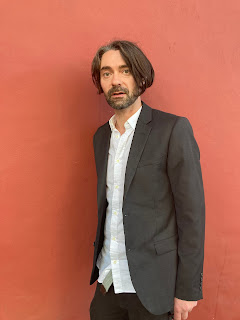By Jonathan Taylor
In this blog I want to introduce the Master's programme in Creative Writing at the University of Leicester, and answer some simple questions that often arise about it - i.e.
- What is the MA in Creative Writing?
- What do you need to apply for the course?
- What modules does the MA in Creative Writing involve?
- What is the rationale behind the course?
- How is it taught?
- Who teaches the course?
- What have MA students gone on to do?
- What other opportunities are associated with the course?
For students' perspectives on Creative Writing MAs see here and here and here.
What is the MA in Creative Writing at the University of Leicester?
This a year-long full-time course, or two-year part-time course that aims to help you develop your writing in a supportive and stimulating environment, taught by experienced writers and lecturers. It's a taught course that provides you with the support, skills, ideas, feedback, structure, community and space that will help your writing to flourish. It's a space for you to develop your own writing.
What do you need to apply for the MA in Creative Writing?
First and foremost, we want students who love writing and reading, who are enthusiastic about the subject, who are willing to experiment. One of the wonderful things about the MA is the exciting mixture of students' hugely varied backgrounds, ages, experiences, ambitions and perspectives. We accept students with a relevant first undergraduate degree or students with significant writing experience. We always ask students to submit a sample of creative work, once they've submitted their initial application. If you have any questions about the application or eligibility, please email Jonathan Taylor: jt265[at]le[dot]ac[dot]uk.
What modules does the MA in Creative Writing involve?
The MA is 12 months long full-time, 24 months long part-time. The modules are arranged as follows:
Full-time route (1 year):
In Semester 1, full-time students take two modules:
- EN 7040 Research Methods in Creative Writing (30 credits)
- EN 7041 Styles: Advanced Creative Writing Workshop 1 (30 credits)
In Semester 2, full-time students take two modules:
- EN 7042 Applications: Publishing, Teaching and Other Stories (30 credits)
- EN 7043 Substances: Advanced Creative Writing Workshop 2 (30 credits)
Over Summer, full-time students then also take:
- EN 7044 Dissertation in Creative Writing (60 credits), usually due mid-September
Part-time route (2 years):
- EN 7040 Research Methods in Creative Writing (year 1, semester 1)
- EN 7042 Applications: Publishing, Teaching and Other Stories (year 1, semester 2)
- EN 7041 Styles: Advanced Creative Writing Workshop 1 (year 2, semester 1)
- EN 7043 Substances: Advanced Creative Writing Workshop 2 (year 2, semester 2)
- EN 7044 Dissertation in Creative Writing, (year 2, Summer), due mid-September
What is the rationale behind the MA in Creative Writing?
I believe that Creative Writing is a wonderful hybrid subject (a kind of Frankenstein's Monster of a subject!), which intermingles academic research, vocational and professional skills, and creative practice - along with bits of other subjects, too.
The different modules on the MA in Creative Writing aim to cater for these various strands: Research Methods in Creative Writing introduces the academic, theoretical and research aspects of the subject; the outward-looking module Applications emphasises the vocational and professional contexts for writing; while Styles and Substances are workshop-based modules which explore various elements of creative practice, introducing both key forms (fiction and poetry) and key themes (e.g. Place, Time, Memory). As your individual extended project, the Dissertation module is the culmination of the MA, and draws on the skills you've developed throughout the course. For the Dissertation, you're allotted an individual supervisor, who guides you through the whole process, and provides on-going support and feedback.
At the centre of all the modules is your writing. Creative Writing is, I think, a subject where people learn by doing - so all of the subjects are explored first and foremost through writing. You write throughout all the modules, and all the modules are assessed (in different ways) primarily through creative work - along with accompanying reflective commentaries, and (in the case of Applications) a short oral presentation.
The MA in Creative Writing at Leicester aims to introduce you to the huge breadth and variety of this amazing subject. You will learn about fiction, poetry, creative non-fiction, memoir, scriptwriting. We want you to experiment across forms and genres, and we believe that you learn by doing so: poets learn a lot by writing prose, and fiction writers learn a lot by experimenting with poetry. There are so many possibilities! During the MA, you may explore topics ranging from ekphrastic poetry, to reviewing, to oral histories, to neuroscience, to psycho-geography, to personal essays, to time travel ...
I believe writing is a learned skill, and can be taught. I believe the study of writing, storytelling, poetry, language is vitally important. And, above all, I believe it should be enjoyable (even though I don't believe in "organised fun"!).
How is Creative Writing taught?
Each module is taught primarily by a two-hour seminar per week, during term time. Seminars might consist of in-situ workshop exercises, sharing work, peer feedback, introductions to and discussions of particular subjects, guest talks, masterclasses, and so on. Individual tutorials are always available, and you will be invited to special events associated with Creative Writing at Leicester (see also below). All students are allotted a personal tutor, who guides them through the course.
Who teaches on the MA in Creative Writing at Leicester?
The course is taught by experienced and professional writers, editors and lecturers. The Creative Writing team at the University of Leicester currently includes Nick Everett, Felicity James, Harry Whitehead, myself (Jonathan Taylor), and Writer in Residence Kit de Waal. There are also guest talks, workshops and masterclasses on the course, given by visiting authors, publishers, editors and others.
What have students on the MA in Creative Writing gone on to do?
Our students are amazing! They regularly publish their creative work in journals and magazines, give performances and readings, win competitions, both during and after the course. Among our graduates, some have gone on to publish books. Some have gone onto further study, at PhD level. Some have gone into publishing, editing, journalism, copywriting, teaching, film-making, arts administration, marketing, and so on. You can see some of our students' most recent successes here.
What other opportunities are associated with the course?
One of the most important aspects a course like this is feeling part of a vibrant community of writers. At Leicester, that community includes BA students, MA students, PhD students, staff, writers in the local community, and guest authors from across the UK. On the MA, you will be part of the Centre for New Writing, which hosts events and opportunities throughout the year, as well as a regular research group. The University hosts Literary Leicester Festival every year, which features a wonderful array of events and readings. You can join our large Facebook group, "Creative Writing at Leicester," on which we feature news, opportunities, articles and calls for submission. We run the popular review blog Everybody's Reviewing and a course blog Creative Writing at Leicester. Nick Everett co-edits poetry publisher New Walk Editions. And there are lots more opportunities in the University and city for writers too. We want you to feel part of all of this, and to contribute to it.
More information?
We're more than happy to answer any queries you have about the MA in Creative Writing at the University of Leicester, and to talk to you about it. Email Jonathan Taylor on jt265[at]le[dot]ac[dot]uk for detailed information and to discuss further!












.jpg)



.jpg)
